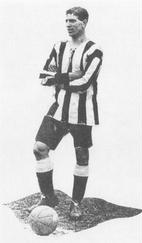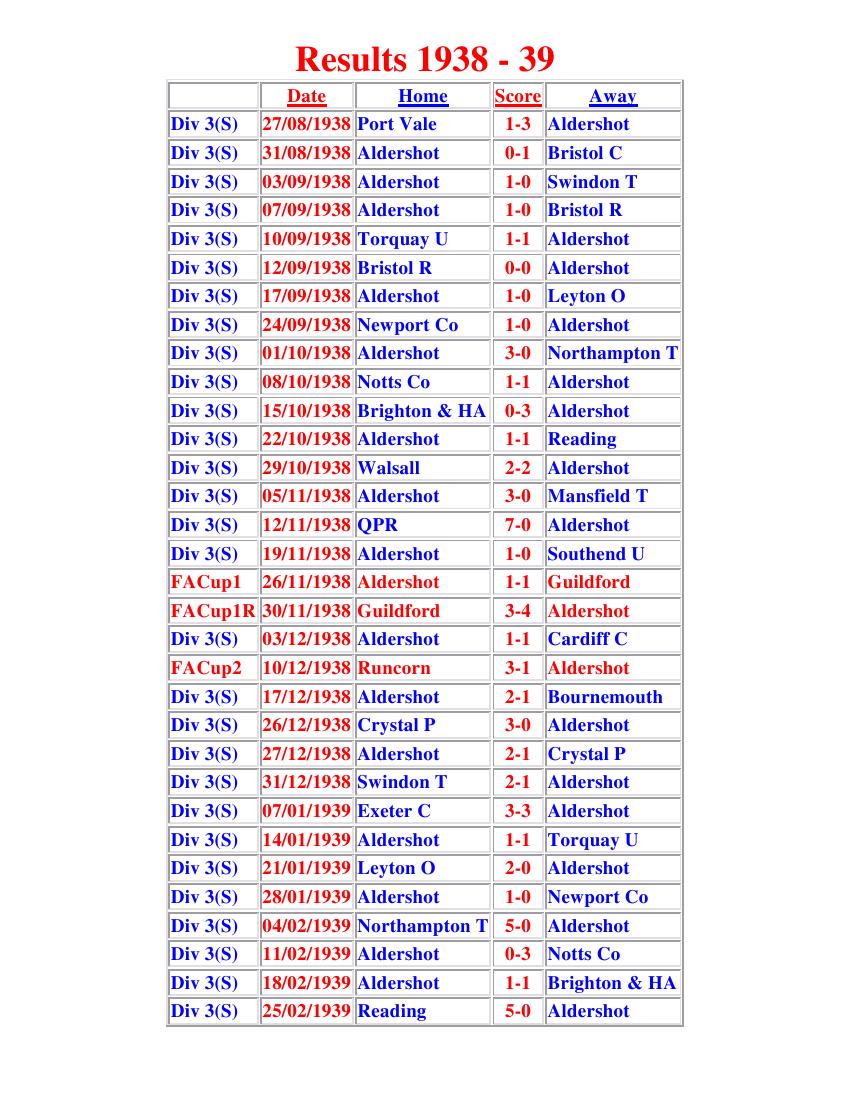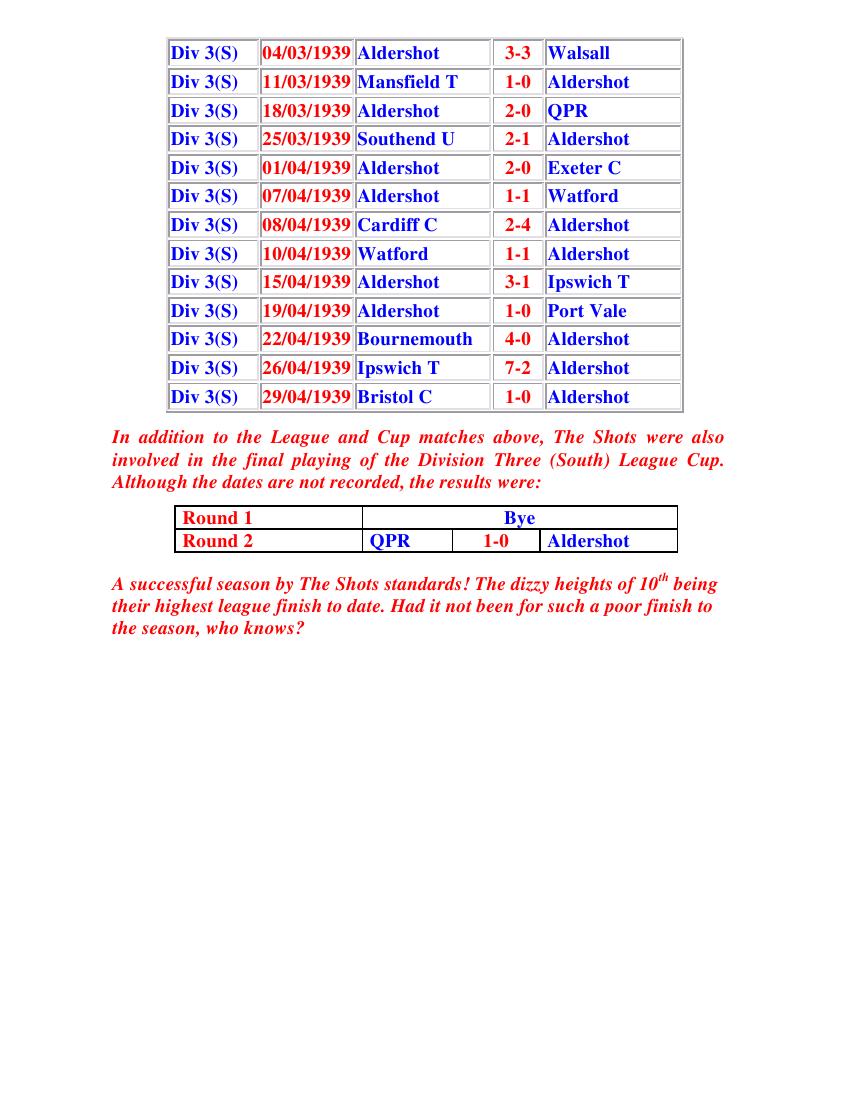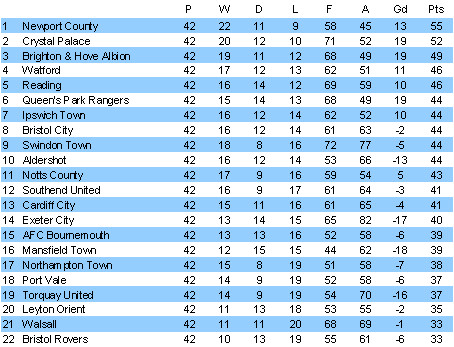Aldershot
Echoes 1937/9
The 1938/9 season was Aldershot's seventh in the Football League. Manager Bill McCracken (pictured left in his playing days) had survived a March "vote of confidence" and steered the club to a modest 18th in Division Three South the previous season, McCracken's first full-season at the helm after taking over a hopelessly adrift bottom-placed side in February 1937.
Twenty-seven players had been used in 1937/8 of which eleven were retained, notably top-scorer and appearance maker Harry Egan (41+13), left-half Billy Burnicle (37+2), left-back George Williams (34) and Gordon Summerbee who'd returned in March from 16 months out with injury. Only Reg Kilsby (31+5) who was released had also made thirty-plus appearances. New signings included wingers Willie Chalmers (Notts County) and George Raynor (Bury), Jimmy Ruffell - a less than sprightly 38 and a FA Cup runner-up with West Ham 15 years previous - and Len Williams returning after two seasons at Charlton.
The season opened with a 3-1 win at Port Vale. Ruffell scored in this match but was injured in the first home game - a 1-0 defeat to Bristol City, runners-up the previous season - and forced to retire from playing. Joe Proud returned to Shots line-up in the next match. Proud, now 32, was the sole remaining member of Shots debut league season in which he'd played all but two matches. Aldershot were ticking along nicely, well placed after 6 wins, 3 draws and just 5 goals conceded in their opening 11 matches when Reading visited on 22 October. Shots line-up was probably the strongest they fielded that season: Greaves, Sheppard, G Williams, Clarke, Summerbee, Burnicle, Proud, Chalmers, Ray, H Egan, L Williams. The derby finished 1-1, Harry Egan scoring for Shots; the match was played before a then record attendance of 15,611, some 5,000 more than the previous ground record.
A 2-2 draw at Walsall and a 3-0 home win over Mansfield was followed by the sale of George Williams to Millwall for £2,000. The next match with Lawrie Kelly replacing Williams was a disastrous 7-0 defeat at Queens Park Rangers. The FA Cup first round paired Aldershot with Southern League neighbours Guildford City, the Rec hosting a 1-1 draw before 11,561 fans, Shots leaked goals but won the replay 4-3 in front of 9,932. Shots rallied in the league with home wins over Southend and Bournemouth and a draw with Cardiff City to maintain pressure near the top of the table. However Cardiff, well below Shots in the league, moved in to sign Harry Egan for £1,500. Hopes of an FA Cup run were dashed with a crushing 3-1 home defeat against Runcorn of the Lancashire Combination- their first League scalp.
Egan's replacement was Peter Simpson, 34 years old and formerly with Reading. Simpson had scored 3 in 23 games the previous season. The Christmas double-header with Crystal Palace brought a 3-0 away defeat, and a 2-1 home win - Chalmers and Simpson scoring. This placed Aldershot third in the table. But just two points were won in the next four matches, and Shots simply had to win to keep touch when league leaders Newport County visited on 28 January. The second largest league crowd of the season 7,999 were rewarded with a last minute header by Chalmers - the game's only goal, and Shots promotion charge looked back on track.
Aldershot started 1938/9 with a mean defence and a pair of forwards - in Cecil Ray and Harry Egan - which amounted to attractive football and Aldershot's first genuine promotion drive. Finances forced the sales of Egan and left-back George Williams and results dropped off. In January a big Recreation Ground crowd cheered on a last gasp winner over leaders Newport County that suggested Shots could get back on track.
Yet this was a false dawn, cheaper replacements were introduced into the side including Wilf Dixon (17) from north-east football, Harry Egan's younger brother Doug (19), Ray Eastwood (Altrincham), Bill Wainwright (Mansfield) and Billy Wilson (Millwall). Shots weakened side recorded one goal and one point in the next four matches. These included a pair of 5-0 away defeats at Northampton and Reading (crowd 8,880). Simpson had been dropped for Willy Wilson but neither could find the net. Cecil Ray scored a hat-trick in the 3-3 draw with struggling Walsall on 4th March, played in front of a dismal 3,444. This at least signalled the end of Shots slump. The team seemed to gel and they collected 9 points from their remaining 5 home matches, Ray and Proud scoring most of the goals. But the season petered out with 3 away defeats including a 7-2 thrashing at Ipswich, who'd been elected at Gillingham cost in the close season. Only five of the eleven who had battled to a mid-season promotion challenge played, Harry Egan's replacement Simpson scored his second goal - a poor return from 14 games.
Shots finished the season in 10th place, with as many points as QPR and Ipswich and only two points behind 4th place. Cecil Ray carried the goal-scoring, a useful 25 goals in 43 games. Gordon Summerbee (42 appearances), Hedley Sheppard (41), William Chalmers (39+10), Joe Proud (38+7), Reg Clarke (37+1) George Raynor (36+4) and George Greaves (35) the spine of a team fatally weakened by the sales of George Willams and Harry Egan. Insufficient attendances were the reason cited for player sales yet Shots averaged 6,138 spectators, a 16% improvement on the previous season and their highest ever average. This total ranked Aldershot the 69th best supported club in the Football League, although most of the clubs this bettered were in Division Three North.
Elsewhere Everton were Champions but they would not finish in the top three again until 1964. Wolverhampton Wanderers were League runners-up for the second season in succession. Wolves were also FA Cup runners-up, Portsmouth winning the Cup for the only time in their history - a comprehensive 4-1. Blackburn and Sheffield United were promoted to the First Division, Barnsley won Division Three North whilst relegated Norwich City replaced Newport County in the Southern section.
A number of Aldershot's older guard retired - or were released and failed to find new clubs including Reg Clarke and Peter Simpson. New signings for the 1939-40 season were Robert Bigg, Albert Dawes (both Crystal Palace), Stan Hurst (Watford) and Ron Palmer (Millwall). The opening home game was lost to 1-0 to Bristol City before 6,000, Shots lined-up: Greaves, Eastwood, Kelly, Palmer, Summerbee, Burnicle, Raynor, Chalmers, Ray, Dawes, Bigg. After two more matches war was declared on 3 September breaking up Shots' team as men were called-up for action and redistributed all over the globe.
A number of Aldershot's players remained in the local area and were able, alongside many "guest players" to play in the regionalized leagues. Joe Proud's last Aldershot game came on 29 March 1941, eight-and-a-half years after Shots' League debut. When the Football League resumed on 31 August 1945 left-back Hedley Sheppard, now 35, was the sole remainder of Shots pre-war sides. Sheppard made 106 appearances over the next three seasons before moving onto Fleet Town. The only other pre-war returnee was Cecil Ray who appeared in a game at Notts County before moving into Sussex local football. Whilst at the helm was Harry McCracken the war years making him Aldershot's longest serving manager, from February 1937 to January 1950.
With grateful thanks to Martin Gooday for generously giving his permission to reproduce this series.



